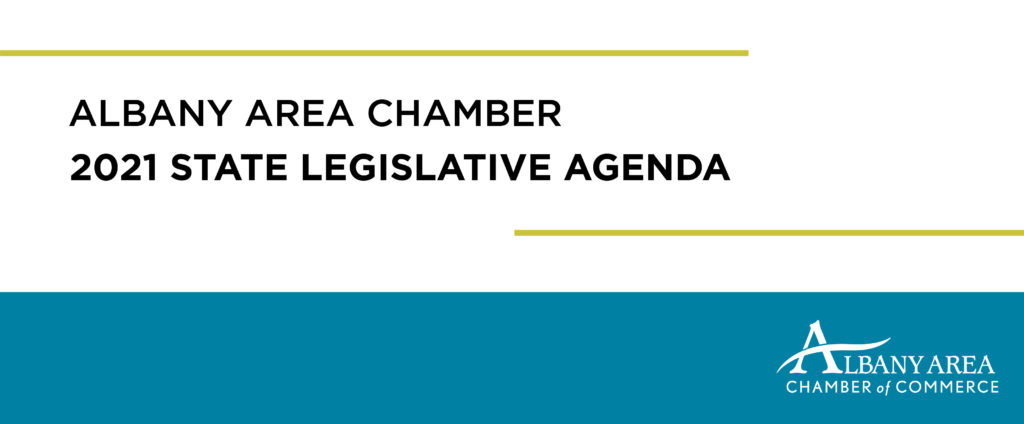
Advocating for a healthy business climate is a programmatic pillar of what we do at the Albany Area Chamber. On Monday, the Georgia General Assembly gaveled in the 2021 legislative session. Georgia is the No. 1 state for business, and has been eight years in a row; the prosperity of the Albany Area and Southwest Georgia contributes to that historic ranking. The Albany Area Chamber will continue actively advocating policy to enhance the Albany Area’s business environment and its quality of life — and, that of Georgia.
Prior to the beginning of the session, the Albany Area Chamber’s Government Affairs Committee (GAC), led by GAC Chairman Jake Reese of LRA Constructors, worked through the fall of 2020 developing our 2021 State Legislative Agenda. This set of priorities was approved by the Albany Area Chamber Board of Directors in November 2020. Bárbara Rivera Holmes, president & CEO of the Albany Area Chamber, presented the priorities to the Albany Area state legislative delegation during a pre-session meeting with other business and community organizations, and strategic partners.
The Albany Area Chamber’s state legislative priorities are listed below. As the 2021 legislative session begins, we want to say how much we appreciate the opportunity to work with our Albany Area state delegation — Senator Freddie Powell Sims and Representatives Gerald Greene, Winfred Dukes, CaMia Hopson and Bill Yearta — and other state leaders, as we have for many years, to advance our priorities.
2021 STATE LEGISLATIVE AGENDA
Funding Priorities
- $6.9 million for construction of the regional health professions simulation lab at Albany State University, which would create increased opportunities for health professions students and better equip them to enter the work force
- $8 million for the Diesel Equipment & Auto Collision Demonstration Center at Albany Technical College, which would reduce the transportation worker shortage by allowing additional space and program enhancements for diesel technology, automotive collision, automotive technology, and commercial truck driving
- $964,000 to continue supporting Math Corps, an AmeriCorps program designed to improve math skills for students in grades K-8
Pro-Business Priorities and Positions
Rural Health Care
- Support initiatives that expand the health professions pipeline, including appropriate licensure reform to grow Georgia’s health care work force and increased investments in educational programs that support Georgia’s health care industry
- Support appropriate reimbursement rates for telemedicine services to increase access to care for all patients
- Support efforts that address mental and behavioral health gaps in rural communities
- Support initiatives and investments that expand access to care and strengthen our regional health care delivery system, such as through the expansion of telemedicine
- Support efforts to enhance Georgia’s trauma care network
Internet & Broadband
- Expand broadband capacity in rural and underserved areas through public-private investment and incentives. Access to and reliable Internet impact education, health care, national defense and commerce.
Business Climate & Economic Development
- Support programs and initiatives that remove barriers for small businesses and expand access to resources
- Maintain current tax incentives, which have proven to assist companies in investing and expanding their footprint in Georgia
- Maintain the state film tax credit, which supports Georgia’s $9.5 billion film industry
- Expand the Rural Quality Job Tax Credit to all Tier 1-lowest 40 communities
- Support state partnerships for greenfield projects that promote regionalism and enhance quality of life, tourism, wellness, and economic development
- Oppose policies that would have a discriminatory effect on Georgia’s ability to grow the economy and maintain a reputation as a leader for global commerce
Education, Talent & Work Force
- Maintain Albany State University as a component of the University System of Georgia
- Support policies that improve college persistence and completion rates to provide an employable and adaptable workforce
- Invest in methods that improve third-grade math and literacy outcomes
Entrepreneurship & Innovation
- Support the investments and the development of programs and policies that facilitate the growth of entrepreneurship and innovation in rural communities
Transportation
- Support investments to expand and modernize transportation infrastructure
- Support education and training programs that expand the transportation work force
- Support partnerships and investments in infrastructure improvements
Military & Defense
- Support policies, investments and partnerships that strengthen Georgia’s military installations and their communities, as well as service members and their families
Natural Resources
- Preserve & enhance access to high-quality, affordable water supplies for businesses and communities in the Albany Area and Southwest Georgia